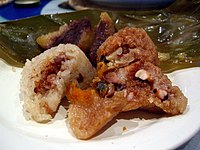zongzi
參見:zòngzi
英語[編輯]
其他寫法[編輯]
- (來自威妥瑪拼音) tsung-tze
詞源[編輯]
Zongzi which have been cut open to reveal their fillings. The one in front is filled with pork, and the one in the background with red bean (azuki bean) paste.
切開以展示內餡的粽子。前面的是豬肉餡,後面的是紅豆餡。
切開以展示內餡的粽子。前面的是豬肉餡,後面的是紅豆餡。
源自官話 粽子 (zòngzi)的拼音轉寫,來自粽 (zòng) + 子 (zi, 指小後綴)。
發音[編輯]
名詞[編輯]
zongzi (複數 zongzi 或 zongzis)
- 粽子
- 1953, Department for International Work, All-China Democratic Women's Federation(中華全國婦女聯合會國際聯絡部) 編, Women of China [中國的女性], Beijing: Foreign Languages Press, →OCLC,頁號 17,列號 2:
- The traditional fare around Dragon Boat Festival time is zongzi, pyramids of glutinous rice wrapped in reed leaves. The zongzi, it is said, symbolize the rice that the Miluo River people threw to the fish so that they would leave Qu Yuan's body undisturbed.
- 1979, China Reconstructs, Beijing: China Welfare Institute, →ISSN, →OCLC,頁號 49:
- The people honor the memory of Qu Yuan on this day by eating Zongzi and holding dragon-boat races. Zongzi are little packets of glutinous rice with jujubes, ham and sweet bean paste added for interest, wrapped in leaves of rushes.
- 在這一天,人們通過吃粽子和賽龍舟來紀念屈原。粽子是一小包的糯米,裡面加了棗子、火腿和甜豆沙,用蘆葦葉包裹着。
- 2005, Lim Hin Fui(林廷輝), Fong Tian Yong(方天養), The New Villages in Malaysia: The Journey Ahead [馬來西亞新村: 邁向新旅程], Kuala Lumpur, Malaysia: Institute of Strategic Analysis & Policy Research(戰略分析與政策研究所), →ISBN,頁號 126:
- A week or two before the festival, villagers would prepare glutinous rice wrapped in bamboo leaves before cooking, commonly known as zongzi or chang (in Hokkien).
- 節前一兩個星期,村民們會在烹調前準備好用竹葉包裹的糯米,俗稱粽子或「粽」(福建話)。
- 2011, Daniel Kalla, The Far Side of the Sky: A Novel of Love and Death in Shanghai, Toronto, Ont.: HarperCollins, →ISBN; paperback版, New York, N.Y.: Forge/A Tom Doherty Associates Book, 2015, →ISBN:
- Sunny ordered four zongzis or dumplings and, out of tradition, haggled with the woman until they agreed on a price.
- 桑尼點了四個粽子或者餃子,並打破傳統,與這位女士討價還價,直到他們最後確定價格。




